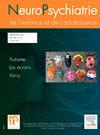Les médiations thérapeutiques et art-thérapies dans la prise en charge des mineurs non accompagnés (MNA) : Une évidence ?
Q4 Medicine
Neuropsychiatrie de l''Enfance et de l''Adolescence
Pub Date : 2025-05-01
DOI:10.1016/j.neurenf.2025.01.007
引用次数: 0
Abstract
Context
In a complex global political and social context, France takes in migrants including unaccompanied minors, mainly from West Africa and Asia. The adversity they have had to face can lead to psychological distress which has an impact on their well-being and quality of life.
Objective
The aim of this article is to provide a synopsis of the psychopathological and socio-cultural difficulties that these children and adolescents may present when they arrive in France. This study focuses on indications and applications of therapeutic/art therapeutic mediations (more specifically theatre) offered to migrant populations.
Method
A literature review was carried out on the psychological support offered in an intercultural context to migrant children and adults. Searches were conducted on bibliographic databases (EBSCP, PubMed and Google Scholar) in addition to grey literature and field practices, to identify the therapeutic mediation/art therapy used. A clinical example is also presented based on clinical practices in an institution.
Results
The effects in migrant populations are recognized by the scientific community, helping to reduce symptoms of adaptive stress due to acculturation and/or post-traumatic stress, anxiety and depression, to increase existential satisfaction and the development of hope, to reduce behavioral difficulties such as hyperactivity, and to play a role in the development of emotional and social skills, self-esteem and resilience. However, few studies have focused specifically on Unaccompanied Minors, even though they present real needs. A clinical focus was placed on the relevance of dramatherapy (therapeutic mediation through theatre), with the development of a standardised and reproducible programme. However, given the extent of their needs and the effectiveness of such therapeutic options, it is very surprising that few studies have focused specifically on unaccompanied minors.
Conclusion
In view of the effectiveness of mediation and art therapy with migrant populations, it seems appropriate and necessary to offer psychological care of this type to unaccompanied minors. Given the increasing numbers of these young people arriving in France, we aim to point out the importance to design and test intervention programs using mixed research methods to assess their clinical impact and to carry out additional standardisation work with recommendations for good practice and training for practitioners.
无人陪伴未成年人(NMs)护理中的治疗和艺术治疗调解:证据?
在复杂的全球政治和社会背景下,法国接收移民,包括主要来自西非和亚洲的无人陪伴的未成年人。他们不得不面对的逆境可能导致心理困扰,从而影响他们的健康和生活质量。目的本文的目的是提供这些儿童和青少年到达法国时可能出现的精神病理和社会文化困难的概述。本研究的重点是提供给流动人口的治疗/艺术治疗药物(更具体地说是戏剧)的适应症和应用。方法对跨文化背景下对流动儿童和成人的心理支持进行文献综述。在书目数据库(EBSCP、PubMed和谷歌Scholar)以及灰色文献和实地实践中进行检索,以确定所使用的治疗调解/艺术疗法。并结合某机构的临床实践,提出了一个临床实例。结果在流动人口中的作用得到了科学界的认可,有助于减少由于文化适应和/或创伤后应激、焦虑和抑郁引起的适应性压力症状,增加存在满意度和希望的发展,减少行为困难,如多动,并在情感和社交技能、自尊和恢复力的发展中发挥作用。然而,很少有研究专门关注无人陪伴的未成年人,即使他们有真正的需求。临床重点放在戏剧疗法(通过戏剧进行治疗调解)的相关性上,并制定了标准化和可重复的方案。然而,考虑到他们的需求程度和这种治疗选择的有效性,很少有研究专门关注无人陪伴的未成年人,这是非常令人惊讶的。结论鉴于流动人口调解和艺术治疗的效果,对无人陪伴的未成年人进行此类心理护理是适当和必要的。鉴于这些年轻人抵达法国的人数不断增加,我们的目标是指出使用混合研究方法设计和测试干预计划的重要性,以评估其临床影响,并开展额外的标准化工作,为从业人员提供良好的实践和培训建议。
本文章由计算机程序翻译,如有差异,请以英文原文为准。
求助全文
约1分钟内获得全文
求助全文
来源期刊

Neuropsychiatrie de l''Enfance et de l''Adolescence
Medicine-Pediatrics, Perinatology and Child Health
CiteScore
0.60
自引率
0.00%
发文量
61
期刊介绍:
Organ of the Société française de psychiatrie de enfant et de adolescent, Neuropsychiatrie de enfance et de adolescence tackles all fields of child-adolescent psychiatry and offers a link between field and clinical work. As a reference and training tool for students and practitioners, the journal publishes original papers in child psychiatry as well as book reviews and conference reports. Each issue also offers a calendar of the main events dealing with the speciality.
 求助内容:
求助内容: 应助结果提醒方式:
应助结果提醒方式:


